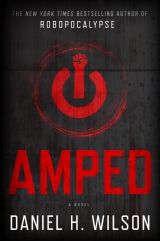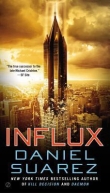
Текст книги "Amped"
Автор книги: Daniel H. Wilson
Соавторы: Daniel H. Wilson
Жанры:
Научная фантастика
,сообщить о нарушении
Текущая страница: 16 (всего у книги 16 страниц)
“We’ve all got a killer inside us,” I whisper, and I bear down with my forearm. Lyle’s eyes widen as his throat collapses, as the arteries and airways close for business. A surprised smile briefly plays over his mouth and his lips part. But no words come out.
Lyle’s black eyes close for the last time.
I watch his still face for a long minute before I let his body fall at my feet. People in the crowd below are confused. A woman screams. And something moves inside the room. Vaughn. He’s propped himself up on one elbow. Face sheened in sweat, he smiles at me and speaks with a bloodstained tongue.
“They’ll never believe you,” he says.
I hear shouting in the hallway, footsteps growing louder. My skin is buzzing, vision wavering. Staggered, I lower my hands onto my knees and double over. I can’t say quite why it feels this way, but I’m thinking that I just killed my best friend. Or my brother. Maybe myself.
Vaughn’s sweat-slicked face is pinched with triumph as he lies back, his strength completely exhausted.
But his smile fades as I reach up and pinch shaky fingertips around the nub on my temple. My retinal video has a cache of the last twenty minutes. I know this because I watched Nick learn it the hard way.
“No,” says Vaughn.
I give myself one deep breath, take hold of the port, and close my eyes.
Then I rip it out.

“Pure Pride” Rocked by Criminal Investigation
PITTSBURGH—In the last several days, the Pure Human Citizen’s Council (PHCC) has lost substantial backing, including from the AARP—one of the nation’s most powerful lobbying groups.
Support has waned to historic lows with the revelation that at least some of the recent internecine violence was caused by mercenary outfits allegedly hired by the PHCC itself. Civil rights proponents have long claimed that Pure Pride rhetoric borders on hate speech and encourages discrimination. Now, some are even claiming that the tri-city attacks were bankrolled by the anti-implantee organization.
The president of the 90 million strong AARP, Dr. Sven Sorenson, sidestepped the allegations and recent arrest of Senator Joseph Vaughn, saying simply that “the majority of our membership agrees that the promise of brain implants as a medical technology outweighs the threat.”
Meanwhile, emboldened civil rights leaders have been calling on other unions, community-based organizations, corporations, churches, student groups, and individuals to also officially withdraw support from the PHCC in a show of solidarity with “implanted individuals who just want their lives back.”

We’re all of us on islands. That’s what Nick says. According to the chattering kid, everybody, whether they’re an amp or a reggie, is on one kind of island or another. Millions of islands, millions of sharks. But billions of bridges. It’s the connections between the things that are important, he says. More important than the things themselves.
Nick has a new backpack and that same old faded Rubik’s cube. He’s pacing my shadow as we cross the field to the government prefab where school is held. The goofy kid doesn’t hold my hand anymore, but he stays close just the same.
We’re rebuilding Eden.
Time seems to move slowly in the humid Oklahoma summer. At night, we sleep on cots in air-conditioned government prefabs. They’re lined up in the field outside Eden like dominoes, crushing the memories of spotlighters into the dirt. Every day they clear more husks of burned trailers away. Scorched patches left on the ground like bad memories.
I thought about going back to Pittsburgh, but my people are here. The people who need me, and the people I need. My own kind, as my father once said.
In the end, it was the technology that saved us.
By the time the ambulance came, Vaughn could barely speak. Ashen-faced, he struggled and gasped and managed to accuse me of trying to murder him. I didn’t resist. Losing my port left me nearly comatose, splayed out on the ground next to Lyle’s corpse.
The cops must have arrested me because I woke up cuffed. Vaughn went into critical care. For a minute, it looked like Lyle was going to get his wish. People were scared and angry and inches away from civil war.
But Vaughn survived. And so did my prosthetic memory.
I waited in the hospital under police watch while they played back my retinal cache and realized what had happened. Cochlear picked up pretty good sound, but even so my lawyer brought in a lip-reader to decipher the video. The prosecution had its own lip-reader, too.
But my case never went to trial.
After that last standoff went viral, Vaughn’s life changed quickly. From what I understand, they arrested him while he was in the hospital. And what with him being the head of a domestic terrorist organization with splinter factions spread across the United States … well, he didn’t make his bail.
Still, he’s a hero to a dangerous few.
Nick runs ahead of me and joins a couple other kids in front of the prefab that serves as our schoolhouse. It’s odd, but he’s got friends now. Smart ones who can keep up with him. A couple of them are waiting with Rubik’s cubes of their own. Nick isn’t shy about telling the tale of his escape from Eden. He’s a half-pint legend now.
I open the door for Nick and his friends. Follow them in.
Inside, thirty-five pairs of eyes stare up at me. Thirty-five nodules on temples, some decorated with glitter and neon lights and others just left alone. The kids sit on government-supplied folding chairs around three mismatched tables. There are no recognizable grade levels. The difficulty of the material has to do with your implant and your natural intelligence. Age is immaterial for these amps.
I lay my books out on an old kitchen table and take a seat. Lucy is already at the table next to mine. The little girls of her class are sitting close to her, hands folded and eyes trained on their teacher like small predatory birds. They are eager to learn. Lucy is patient and caring and she never underestimates her students.
I reach across the aisle and take Lucy’s hand. She gives my palm a squeeze and her grasp is strong and warm. Nick raises his eyebrows at me and I just shake my head.
“Okay, class,” I say. “Today, we’re going to study government. There aren’t enough books, so those of you with modded retinal implants should scan the pages and then share with your neighbor.”
Humankind needs technology.
It’s the one thing that we do better than any other animal. We communicate, cooperate, and make tools to extend our reach. Every new tool changes us. As we grow, sometimes parents find they can’t recognize their children. The old fears the new, and the two threaten to destroy each other.
Our technology is what makes us strong. And it’s what makes us dangerous.
Before the implants, plenty of these kids were a little slobbery. A little slow. Now they’re faster, smarter versions of who they were. They’re on their way to becoming altogether new types of people. It’s frightening. But the landscape of our lives evolves in lurches. There is no stopping and no going back. There never was.
We just didn’t know it.
I’ve heard it said that technology makes a good person better, and it makes a bad person worse. That’s okay with me. I say we keep building new versions of ourselves, keep exploring the unknown, and keep growing.
We’re gonna be fine. Different, but fine.
Because most people are good. Right?

I owe deep thanks to many people who helped this book in all kinds of ways:
The students and faculty of the University of Tulsa and Carnegie Mellon University for sharing (and continuing to share) their knowledge and expertise.
Ron Randall for a couple of great illustrations and a quick turnaround.
My many friends and experts, including Donnell Alexander, Ryan Anfuso, Mark Baumann, Ryan Blanton, Colby Boles, Paul Carpenter, Taylor Clark, Courtenay Hameister, Matt Holley, Jonathan Hurst, Brian Long, Philip Long, Brett Lundmark, Amalia Marino, Shelley McLendon, Alex Nydhal, Geoff Shaevitz, David Spencer, Cynthia Whitcomb, Timmy Williams, and David Wilson. And my absentminded apologies to anyone else whom I may have forgotten.
My parents, Dennis and Pam, who are in the fabric of everything I write.
Special thanks to my editor, Jason Kaufman, for insight and a long walk in the park. As always, deep gratitude to my agent, Laurie Fox, and manager, Justin Manask, for their unflagging enthusiasm and support.
And finally, all my love always to Anna and Cora.

DANIEL H. WILSON is the author of the New York Times bestseller Robopocalypse, the young adult novel A Boy and His Bot, and the nonfiction titles How to Survive a Robot Uprising, Where’s My Jetpack?, How to Build a Robot Army, The Mad Scientist Hall of Fame, and Bro-Jitsu: The Martial Art of Sibling Smackdown. Wilson earned a PhD in robotics from Carnegie Mellon University. He lives and writes in Portland, Oregon.
Also by Daniel H. Wilson
Robopocalypse
• •
A Boy and His Bot
Bro-Jitsu
The Mad Scientist Hall of Fame
How to Build a Robot Army
Where’s My Jetpack?
How to Survive a Robot Uprising









